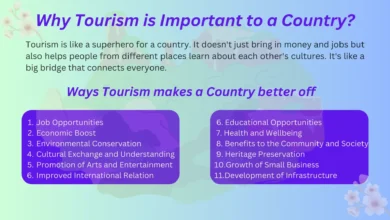The Importance of Research in Tourism
 |
Introduction:
You have an amazing idea to start a new business in the tourism industry, but before you begin you need to do research in tourism and find out if there’s enough market for it. You’ll also want to see if people are interested in your product or service, and if so, how much they’re willing to pay for it. This guide on how to do market research will help you find the answers you need before jumping into any new business venture! We will also focus on the importance of research in tourism.
Market Research in Tourism
As a new or existing tourism business, it is important to understand your target market so that you can cater your product or service to their needs. It is through marketing research in tourism that you are able to collect data on how tourists behave and their motivations for visiting a particular destination. This can be used as an aid when making decisions about your company’s strategy moving forward.
For example, if you notice a rise in older couples visiting your city, then it might be worth considering offering more romantic activities such as candlelit dinners. There are many different types of marketing research techniques available including surveys, focus groups, and online panels. These techniques help with research in tourism. If using online panels, then consider whether they will be representative of your target audience.
For example, if researching families with young children then ensure that participants within your panel have children under 18 years old living at home with them (or similar). You may also want to consider running multiple sessions of each type of research technique. You should ask yourself: What do I want to learn from my research? before deciding which techniques are best suited to your project.
Conducting research in tourism too early could mean that you don’t get enough responses to draw any conclusions. Conducting research too late could mean that there is not enough time left in your project plan to implement any changes based on what you find out. Once complete, review all of your findings and compare them against each other – look for patterns across all results – both quantitative and qualitative – then use these insights to inform future decision-making.
Be sure to include details of your research methodology in your final report. This will help others who read it to understand how you reached your conclusions and how reliable they are likely to be. Remember, though, that no matter how much planning you do, things change over time and your plans may need adjusting; accordingly, however, well-thought-out they were original!
Finally, remember that conducting research does not guarantee results. While research in tourism is a good way to start it does not guarantee success. The only way to achieve success is by implementing recommendations made by your research and following up on them until you see a positive impact on your business. Even then, continue monitoring trends to make sure that you stay ahead of competitors.
Research in Tourism; Market Analysis
Tourism is not a static business. Like any other business, it has to adapt to changing circumstances. Marketing research can help tourism businesses do just that by keeping them abreast of market changes that they may need to respond to. This saves them time and money since they won’t have to engage in a major marketing campaign only for it to turn out that customers don’t respond as positively as anticipated.
It also helps them identify niche markets they hadn’t considered before. For example, if you are planning on launching a new hotel on a popular beachfront, you might be interested to know that there are many more tourists visiting your area than residents. This means there is an untapped source of potential guests who would be happy to stay at your hotel rather than one further inland where prices are higher.
You could use marketing research to determine how many people will visit your location each year, what their average age is, what percentage comes from which country or region, and how much they tend to spend while on holiday. You could then tailor your offer to appeal specifically to these people so that you attract even more visitors than expected. In addition, marketing research allows you to track whether certain tactics are working or not.
For example, you might want to find out whether advertising in local newspapers is more effective than advertising online. Or perhaps an outdoor billboard attracts more customers than posters placed inside local hotels. Marketing research can answer all these questions so that your efforts aren’t wasted. Ultimately, marketing research provides tourism businesses with valuable information about their target audience and allows them to reach those audiences effectively with a product that appeals directly to them. As such, marketing research is essential for anyone running a tourism business.
Research in Tourism; Undersanding Results
Marketing research is an integral part of any travel and tourism business, for three main reasons:
1) customers are becoming more informed about new products and services, making it increasingly difficult to reach them via traditional means.
2) younger customers value transparency over all else, meaning that businesses need to be very clear on their messaging.
3) marketing budgets are becoming smaller and smaller. So, what can you do to combat these issues? By conducting your own marketing research, you’ll be able to stay ahead of your competitors by understanding your target market better than they do. And when combined with qualitative data (e.g., customer feedback), it will give you a holistic view of your customer base.
Consumers today want to feel as though they’re being heard and there’s no better way to achieve that than by collecting feedback from them directly. By using a survey, you can ask your customers what they like about your product or service, and what you could do to improve it.
And if you’re looking for more ways to reach out to your target market, consider hosting a focus group or conducting an online poll on social media platforms such as Facebook and Twitter. (See our tips on how to conduct a focus group here.)
One of the most important steps when starting any business is getting organized and marketing research is no exception! By conducting a SWOT analysis, you’ll be able to understand your own strengths and weaknesses, as well as those of your competitors. This will help you create a strategy that takes into account both internal and external factors, and ultimately make your company more successful.
Today’s consumers are looking for transparency from brands, meaning that businesses need to be very clear on their messaging. But how can you ensure that your target market understands what you do? By conducting a marketing audit, you can determine what your company is already doing well—and where it could use some improvement.
What better way to gain an understanding of your target market than by speaking with them directly? By hosting a focus group or conducting an online poll, you can get valuable feedback from customers about what they like and dislike about your product or service and then use it to make improvements.
Conclusion:
All businesses need to understand their customers, and tourism is no different. Conducting marketing research allows you to gather pertinent data about your target market so that you can tailor your tourism business. Plus, it allows you to make changes on a strategic level—and those types of changes help any business grow! So while it’s critical for startups to focus on marketing research, it’s also important for established businesses. After all, there’s always room for improvement.
What is Marketing Research in Tourism? When most people think of marketing research, they think of studying consumer trends: Who are your customers? What do they want from you? Where do they live? Are there enough of them to support your business model? These are just some examples of questions that fall under marketing research; it goes far beyond consumer trends.
Marketing research helps provide answers to questions like these: What are my customer’s wants and needs as related to my product or service? What will motivate my customers to buy? How can I improve upon what I already have? Once you have answers to these questions, you’ll be able to make strategic decisions that will help guide your business into a profitable future. If You Don’t Know Your Customers, You Don’t Know Your Business Today’s consumers are more informed than ever before when it comes to making purchasing decisions. They want value for their money and expect quality products and services.
That means that if you don’t know who your customers are, how they feel about your brand, and how they interact with your products or services, then you don’t know anything about running a successful business. Market research helps bridge that gap by giving insight into exactly who is buying your product or service and why. For example, let’s say you own a bakery and want to sell wedding cakes.
You might conduct market research to find out things like: How much should I charge for my wedding cakes? Do brides prefer chocolate cake over vanilla? Do they want fondant icing or buttercream icing? Is it better to offer tiered pricing based on flavor, size, etc.? Without knowing your customers, you would never know how to price your wedding cakes. Or even if you did decide on a price point, without knowing your customer base you wouldn’t be able to determine whether or not that price point was appropriate.




